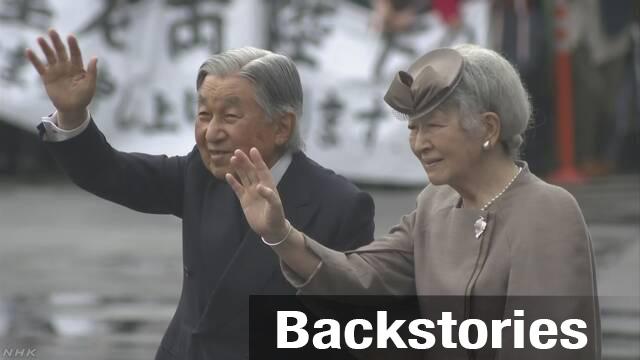The Heisei era has been marked by a series of deadly natural disasters. The 1991 eruption of Mount Unzen-Fugen in southwestern Japan. The Great Hanshin Earthquake in 1995. The quake and tsunami that struck Japan's northeast in 2011.
The Imperial couple has visited all the affected areas. They have met with survivors who lost loved ones and offered words of encouragement, and witnessed recovery efforts.
NHK accompanied the Emperor and Empress on this last visit to disaster-hit Tohoku region before abdication. Here is our special coverage.
Emperor and Empress meet evacuees affected by Fukushima Daiichi nuclear accident
The Imperial couple arrived in Fukushima prefecture by bullet train on June 9th. They first headed to a public housing complex for evacuees in the city of Iwaki. It is now home to some 440 people from the towns of Tomioka, Okuma, Futaba and Namie. Many of the towns' residents were forced to evacuate due to the nuclear accident.
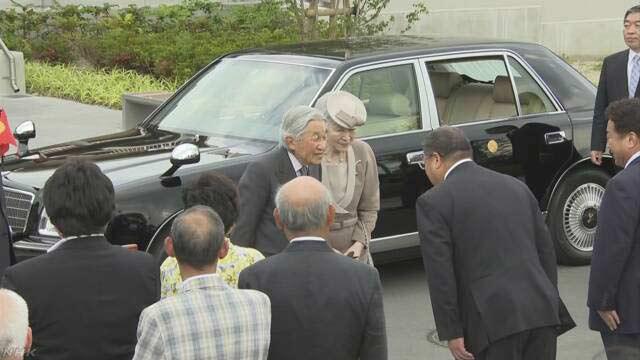
About 700 people, residents of the complex and neighbors, greeted the Imperial couple, waving small flags. The couple met residents in front of a community facility. "How are you doing?" "Has your life returned to normal?" The couple spoke to about 20 people. They have done this whenever they've visited disaster-hit areas.
The couple met with resident representatives at the community facility. Some seemed nervous before the meeting. Then the Emperor and Empress talked to them. "Was your family safe?" "You must have suffered a lot." This seemed to put the residents at ease. They started sharing stories about moving from one shelter to another, and how their life is finally returning to normal.
The conversation was scheduled for only 20 minutes but it lasted longer. A prefectural official said time was up, but the Emperor kept on talking to the residents.
"You must have endured many hardships. What was the toughest experience?"
Listening to survivors, trying to share their feelings, the Imperial couple has been doing this for the past 30 years. Finally, the Emperor spoke to all the residents together, with a smile.
"You must have suffered a lot, but I hope you'll overcome the hardships to lead a good life. I wish you all well.” As he got up to leave, the Emperor spoke once more. "I hope you'll live happily, and I wish you good health."
The no-entry zone
On the second day of their visit, the Emperor and Empress headed to the tree-planting ceremony at the city of Minami-soma. NHK followed the Imperial convoy. While traveling on the Joban expressway, the vehicles passed through the area where radiation levels remain high and entry is restricted. Along the road are temporary storage sites for contaminated waste and vacant houses. Rice fields are now filled with weeds.
The scenery gave the sense that there has been little progress in the reconstruction of the area, even 7 years on. The Imperial convoy reduced its speed as it passed. It was as if the Emperor and Empress were also taking in the desolate scenery.
When the convoy approached the towns of Okuma and Futaba, they vehicles slowed down once again. The area is about 5 kilometers from the Fukushima Daiichi nuclear plant. An official with the Imperial Household Agency says inside the car, the Emperor and Empress were looking in the direction of the plant.
Significance of the tree-planting ceremony
This year's was the 69th annual tree-planting ceremony. The tradition began in 1950 as part of efforts to rebuild war-torn Japan. The late Emperor Showa attended the ceremony every year. Emperor Akihito has kept up the tradition with Empress Michiko.
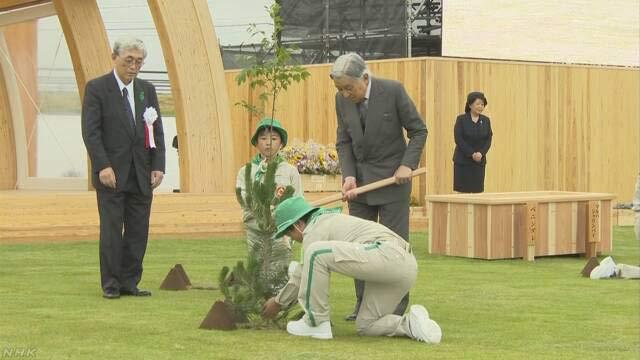
The final ceremony of the Heisei era took place in a coastal area of Minami-soma devastated by tsunami. The 2011 tsunami swept away entire residential areas and vast swaths of rice fields. The vicinity of the ceremony venue is still designated as a high-risk zone where people cannot live. Efforts to rebuild rice and farm fields are making progress. But the green has yet to be restored.
Children from Fukushima gave the Imperial couple seedlings. Fukushima governor Masao Uchibori told reporters that the Imperial couple seemed happy about how the ceremony would pass on history to the children.
Our reporters also felt that the couple was reassured that children are bringing hope to the future of Fukushima.
Sharing sorrow with survivors
The morning of the final day of the trip, June 11th, NHK was told that the Empress had developed a fever the night before, and that the Emperor would attend the remaining events alone.
They were scheduled to attend a memorial service in the city of Soma. As our reporters prepared to release a story on the Empress, we were informed that she would attend the memorial service as planned. It gave our reporters a sense of how strongly she wanted to complete the trip.
A memorial monument has been erected in Haragama district in the city of Soma's coastal area. More than 200 people there died. The Emperor and Empress visited 2 months after the disaster to mourn the victims.
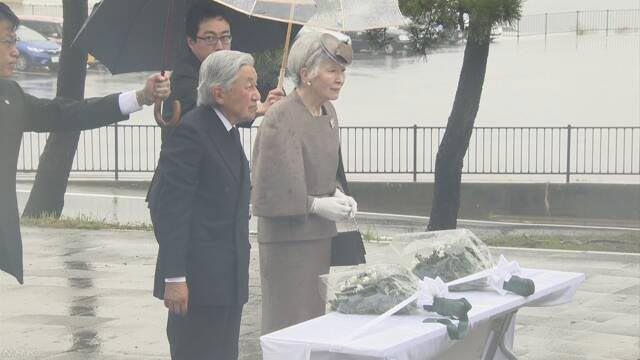
At this year's service, the Imperial couple offered white chrysanthemums to the monument under the rain and bowed deeply to pay tribute to the deceased. They later met with the families of volunteer firefighters who lost their lives while evacuating residents. "We are very sorry for your loss." "You must miss your son very much. He was still in the prime of his life." The family members shed tears for their loved ones and it was clear their sorrow hasn't lessened in 7 years.
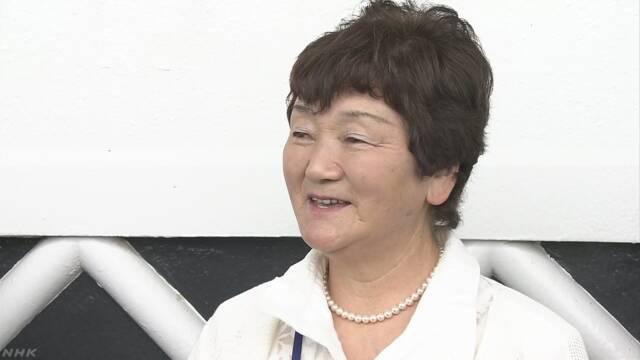
Yoko Abe, 71, lost her eldest son. Kenichi, 39, was deputy branch leader of the volunteer firefighters. He lost his life while calling for residents to evacuate after helping his parents get to high ground. "I'm proud of my son for helping people in the area," Abe told NHK. "But I wish he had escaped with them to safety."
"I'll never lose this feeling no matter how many years pass by."
The Emperor and Empress told her, "Your son saved so many lives. Thank you very much." After meeting the Imperial couple, Abe said "They gave me kind words. It made me want to stay positive. I'll try my best by always keeping their words in my mind."
Compassion for people affected by rumors
The couple later visited a fishing port being rebuilt from tsunami damage. Fukushima Prefecture's fish catch has dropped significantly since the disaster. But shipping restrictions on almost all kinds of fish have been lifted, so there is hope that things will get better.
The Empress talked to women sorting out unloaded fish. "You must have gone through such hardship. I admire your endurance." The Emperor and Empress have long been concerned about the damage to the local industry caused by rumors of contamination following the nuclear accident. On this day, they bought flounder and shell fish, and had lunch made with ingredients produced in Fukushima Prefecture.
As the Empress left the women at the port, she made a fist near her chest. It was a familiar gesture.
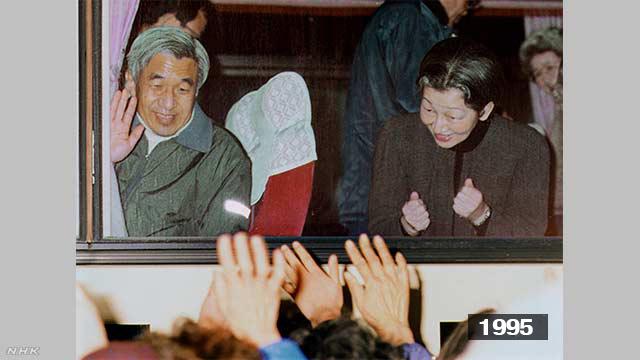
When the Imperial couple visited the affected area after the Great Hanshin-Awaji Earthquake in 1995, the Empress made this same gesture to survivors. "Stay strong." The Empress seemed to be sending her sympathies to the women.
End of the road
In the evening of June 11, the Emperor and Empress had completed their schedule and arrived at Fukushima Station. Many people gathered to see them off. The Imperial couple waved as the people cheered from all directions. At the last moment, they walked toward the crowd, seemingly reluctant to leave.
It would not have been strange for the couple to be tired during the trip, considering their advanced age. But their commitment to meeting with people never wavered.
Yutaka Kawashima, who headed the Board of Chamberlains of the Imperial Household Agency at the time of the Great East Japan Earthquake, is familiar with the way the Imperial couple gets involved with people. "They try to talk with as many people as possible and make eye contact. That encourages people and gives them courage to come forward. I believe they will continue to try their best to interact with people until their final day as the imperial couple."
NHK will continue to cover their activities in support of people affected by disaster until the day of the abdication.
